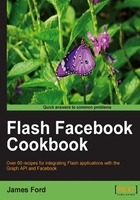
Downloading the Facebook ActionScript 3 SDK
There are two ways to get the source code for the Facebook ActionScript SDK—one is simply download a precompiled version of the source code, and for that all you need is an Internet connection.
The other way to obtain the source code is to download the very latest version directly from a source control repository.
There are in fact two main versions of the Facebook ActionScript 3 SDK. One is the 'Official' version of the SDK, hosted in a Subversion repository on Google code, maintained and updated by teams associated with Adobe and Facebook; and the other is more of a community-driven effort, stored in a Git repository and hosted on GitHub.
In this recipe and all of the recipes in this Cookbook, we will be working with a branch of the community-driven version of the Facebook ActionScript 3 SDK, rather than the 'Official' version of the SDK.
Getting ready
To download the SDK from Git, we need to have Git installed on your computer, which can be downloaded and installed from the URL: http://git-scm.com/.
How to do it...
- If you have no desire to work with code which includes version-control information, both the precompiled SWC files and the raw ActionScript source code for the Facebook ActionScript 3 SDK can be downloaded from the following URLs:
- Within the pages at these URLs, select the Downloads button that appears in the top-left of the page, and you'll get popup containing the download options:

- To download the raw ActionScript files, select the Download .zip option—listed under the DOWNLOAD SOURCE heading—or to download the precompiled SWC file, select the Facebook Web SDK.swc (or the Facebook Desktop SDK.swc) file—listed under the DOWNLOAD PACKAGES heading.
- Alternatively, if you have Git installed, you can clone the entire repository, including its past history and references to its original source location, with the following command-line statement:
git clone git@github.com:psyked/facebook-actionscript-api.gitor
git clone git@github.com:psyked/facebook-air-api.git
This command will create a new folder with the name 'facebook-actionscript-api' and within that, create three key folders—docs, examples, and src. Unsurprisingly, these folders contain the source code for the library, the documentation for the library, and several sample applications, respectively.
How it works...
The download locations for this recipe, and the source code for the Facebook SDKs which form the backbone of the recipes in this cookbook, point to Git repositories which are hosted by GitHub.
The source code for this repository is itself originally based on the official version of the SDK which is hosted on Google code, but it has been extended and expanded by other developers, (primarily Mark Walters, of http://yourpalmark.com/). The advantage of using our community-driven version of the SDK over the official one is that the source code is traditionally updated much more frequently, and includes a wide array of value-object classes, which the official version of the SDK does not yet include.
There's more
Not sure which version of the SDK is best for your project?
The Flash Player version, or the AIR version of the SDK?
In addition to the different download options, there are also two different versions of the Facebook ActionScript 3 SDK, and the one which we will use depends on whether we're building desktop applications that run in Adobe AIR, or browser-based applications that use the Flash Player.
Both versions of the SDK are available for download from GitHub, but you can only use the Adobe AIR libraries with an Adobe AIR project, and the web-based libraries will only work properly with a web-based Flash Builder project that has the Facebook JavaScript SDK included in the HTML template, which is what we'll look at in the next recipe, Preparing your Flash Player application's HTML template for Facebook integration.
What if I want to build my own Facebook library?
There's nothing 'magical' about this Facebook ActionScript API—everything it can do is built on standard capabilities of ActionScript 3 and the Flash Player. If you wanted to, it's entirely possible to write your own code that works with Facebook without using this library, but why, as mentioned in the introduction, should you re-invent the wheel?
That doesn't mean that the official API isn't subject to an occasional change—the move by Facebook to the 'Open Graph' in 2010 is evidence of that—but it does mean that there's always going to be someone maintaining the project and making sure it works with the latest version of the Facebook API.